- Home
- Laini Taylor
Muse of Nightmares
Muse of Nightmares Read online
Copyright
This book is a work of fiction. Names, characters, places, and incidents are the product of the author’s imagination or are used fictitiously. Any resemblance to actual events, locales, or persons, living or dead, is coincidental.
Copyright © 2018 by Laini Taylor
Cover art by Maggie Edkins. Bird shape © Aleksandr Sulga/Shutterstock.com. Bird wing texture © sangsiripech/Shutterstock.com. Metal texture © Abstractor/Shutterstock.com. Cover design by Karina Granda.
Cover copyright © 2018 by Hachette Book Group, Inc.
Hachette Book Group supports the right to free expression and the value of copyright. The purpose of copyright is to encourage writers and artists to produce the creative works that enrich our culture.
The scanning, uploading, and distribution of this book without permission is a theft of the author’s intellectual property. If you would like permission to use material from the book (other than for review purposes), please contact [email protected]. Thank you for your support of the author’s rights.
Little, Brown and Company
Hachette Book Group
1290 Avenue of the Americas, New York, NY 10104
Visit us at LBYR.com
First Edition: October 2018
Little, Brown and Company is a division of Hachette Book Group, Inc.
The Little, Brown name and logo are trademarks of Hachette Book Group, Inc.
The publisher is not responsible for websites (or their content) that are not owned by the publisher.
Library of Congress Cataloging-in-Publication Data
Names: Taylor, Laini, author.
Title: Muse of nightmares / Laini Taylor.
Description: First edition. | New York ; Boston : Little, Brown and Company, 2018. | Summary: “As humans and godspawn reel in the aftermath of the citadel’s near fall, a new foe shatters their fragile hopes, and the mysteries of the Mesarthim are resurrected.”—Provided by publisher.
Identifiers: LCCN 2018022800| ISBN 9780316341714 (hardcover) | ISBN 9780316341707 (ebook) | ISBN 9780316341721 (library edition ebook)
Subjects: | CYAC: Adventure and adventurers—Fiction. | Sisters—Fiction. | Fantasy.
Classification: LCC PZ7.T214826 Mus 2018 | DDC [Fic]—dc23
LC record available at https://lccn.loc.gov/2018022800
ISBNs: 978-0-316-34171-4 (hardcover), 978-0-316-34170-7 (ebook), 978-0-316-52640-1 (int’l)
E3-20180827-JV-PC
Contents
Cover
Title Page
Copyright
Dedication
Map
Part I 1. Like Jewels, Like Defiance
2. Fresh Horrors
3. A Ragged Little Girl with Beetle Shell Eyes
4. War with the Impossible
5. The Sting and the Ache
6. Every One Cried “Monster”
7. Wraith
8. Streets as Full as Veins
9. A Dead God’s Closet
10. Ghosts Don’t Burn
11. Cannibals and Virgins
12. Witchlight and Rue
13. Teeth
14. Pieces on a Game Board
15. Tea Break from the End of the World
Part II 16. Of the Stars
17. Nice Dreams Now and Then
18. Gray
19. First Ghost Nightfall
20. Plenty of Feelings
21. From a Long Line of Indignant Nostrils
22. Do You Want to Die, Too?
23. Minya’s Red Hand
24. Blue Stew
25. Isagol’s Broken Toy
26. Dizzy Little Godspawn
27. The Living and the Ghosts
Part III 28. Buried Gifts
29. Warp
30. Like Eating Cake in Dreams
31. A Man Who Loves You Enough to Come Back to You Even When You’re a Biting Ghost
32. All the Jagged Edges
33. The Unmourned
34. Bacon Destiny
35. Whatever This Fate Was
36. Nothing Special
37. The Punishment Is Death
38. The Sea Stared Back
39. Treacherous Whisper
40. Onslaught
41. Only Everything
42. “Dead” Was the Wrong Answer
43. Violent Radiance
44. A Pirate’s Smile
45. If Stabbing Were a Dance
46. Like a Man Tearing Out His Own Beating Heart
Part IV 47. A Secret with a Secret
48. They Beheld Abominations
49. Good Little Girls Don’t Kill. They Die.
50. More to the Story
51. Happy Evanescence
52. Dread Was a Pale-Haired Goddess
53. A Creature Riddled with Empty Spaces
54. Merry Hell Indeed
55. Peace and Pastries
56. Pirates of the Devourer
57. Awe, Elation, Horror
58. A Dying Wish
59. A Game that Kill Could Not Win
60. Thin Ice
61. Message in a Bottle
62. The Ones Who Know
Part V 63. It Would Be Stranger If There Weren’t Dragons
64. A New Generation of Wishes
Epilogue
Acknowledgments
For my mom
PART I
elilith (el·LIL·lith) noun
Tattoos given to the girls of Weep, around their navels, when they become women.
Archaic; from the roots eles (self) + lilithai (destiny), signifying the time when a woman takes possession of her destiny, and determines the path of her own life.
1
LIKE JEWELS, LIKE DEFIANCE
Kora and Nova had never seen a Mesarthim, but they knew all about them. Everyone did. They knew about their skin: “Blue as sapphires,” said Nova, though they had never seen a sapphire, either. “Blue as icebergs,” said Kora. They saw those all the time. They knew that Mesarthim meant “Servants,” though these were no common servants. They were the soldier-wizards of the empire. They could fly, or else they could breathe fire, or read minds, or turn into shadows and back. They came and went through cuts in the sky. They could heal and shape-shift and vanish. They had war gifts and impossible strength and could tell you how you’d die. Not all of these things together, of course, but one gift each, one only, and they didn’t choose them. The gifts were in them, as they were in everyone, waiting—like an ember for air—should one only be so lucky, so blessed, to be chosen.
As Kora and Nova’s mother had been chosen on the day, sixteen years ago, that Mesarthim last came to Rieva.
The girls were only babies then, so they didn’t remember the blue-skinned Servants and their gliding metal skyship, and they didn’t remember their mother, either, because the Servants took her away and made her one of them, and she never came back.
She used to send them letters from Aqa, the imperial city, where, she wrote, people weren’t just white or blue, but every color, and the godsmetal palace floated on air, moving from place to place. My dears, said the last letter, which had come eight years ago. I’m shipping Out. I don’t know when I’ll return, but you will certainly be women grown by then. Take care of each other for me, and always remember, whatever anyone tells you: I would have chosen you, if they had let me choose.
I would have chosen you.
In winter, in Rieva, they heated flat stones in the fire to tuck into their sleeping furs at night, though they cooled off fast and were hard under your ribs when you woke. Well, those five words were like heated stones that never lost their warmth or bruised your flesh, and Kora and Nova carried them everywhere. Or perhaps they wore them, like jewels. Like defiance. Someone loves us, their
faces said, when they stared down Skoyë, or refused to cringe before their father. It wasn’t much, letters in the place of a mother—and they only had the memory of the letters now, since Skoyë had thrown them in the fire “by accident”—but they had each other, too. Kora and Nova: companions, allies. Sisters. They were indivisible, like the lines of a couplet that would lose their meaning out of context. Their names might as well have been one name—Koraandnova—so seldom were they spoken separately, and when they were, they sounded incomplete, like one half of a mussel shell, cracked open and ripped in two. They were each other’s person, each other’s place. They didn’t need magic to read each other’s thoughts, only glances, and their hopes were twins, even if they were not. They stood side by side, braced together against the future. Whatever life might force on them, and however it might fail them, they knew they had each other.
And then the Mesarthim came back.
Nova was first to see. She was on the beach, and she’d just straightened up to swipe her hair out of her eyes. She had to use her forearm, since she held her gaff in one hand and flensing knife in the other. Her fingers were cramped into claws around them, and she was gore all the way to her elbows. She felt the sticking drag of half-dried blood as she drew her arm across her brow. Then something glinted in the sky, and she glanced up to see what it was.
“Kora,” she said.
Kora didn’t hear. Her face, blood-streaked, too, was blanched with numb endurance. Her knife worked back and forth but her eyes were blank, as though she’d stowed her mind in a nicer place, not needing it for this grisly work. An uul carcass hulked between them, half flayed. The beach was strewn with dozens more carcasses, and more hunched figures like theirs. Blood and blubber clotted the sand. Cyrs skirled, fighting for entrails, and the shallows boiled with spikefish and beaked sharks drawn to the sweet, salty reek. It was the Slaughter, the worst time of year on Rieva—for the women and girls, anyway. The men and boys relished it. They didn’t wield gaffs and knives, but spears. They did the killing, and hewed off the tusks to carve into trophies, and left all the rest where it lay. Butchering was women’s work, never mind that it took more muscle, and more stamina, than killing. “Our women are strong,” the men boasted from up on the headland, clear of the stink and the flies. And they were strong—and they were weary and grim, trembling from exertion, and streaked with every vile fluid that leaks out of dead things, when the glint caught Nova’s eye.
“Kora,” she said again, and her sister looked up this time, and followed her gaze to the sky.
And it was as if, though Nova had seen what was there, she couldn’t process it until Kora did, too. As soon as her sister’s eyes fixed on it, the shock rocked through them both.
It was a skyship.
A skyship meant Mesarthim.
And Mesarthim meant…
Escape. Escape from ice and uuls and drudgery. From Skoyë’s tyranny and their father’s apathy, and lately—sharply—from the men. Over the past year, the village men had started pausing when they passed, looking from Kora to Nova and Nova to Kora like they were choosing a chicken for slaughter. Kora was seventeen, Nova sixteen. Their father could marry them off anytime he pleased. The only reason he hadn’t yet was because Skoyë, their stepmother, was loath to lose her pair of slaves. They did most of the work, and looked after their troupe of little half brothers, too. Skoyë couldn’t keep them forever, though. Girls were gifts to be given, not kept—or more like livestock to be sold, as any father of a desirable daughter on Rieva was aware. And Kora and Nova were pretty enough, with their flax-fair hair and bright brown eyes. They had delicate wrists that belied their strength, and though their figures were secret under layers of wool and uul hide, hips, at least, were hard to conceal. They had curves enough to keep sleeping furs warm, and were known to be hard workers besides. It wouldn’t be long. By Deepwinter, surely, when the dark month fell, they would be wives, living with whoever made their father the best offer, and no longer with each other.
And it wasn’t just that they’d be split apart, or that they had no will to be wives. The worst thing of all was the loss of the lie.
What lie?
This is not our life.
For as long as they could remember, that was what they’d told each other, with and without words. They had a way of looking at each other, a certain fixed intensity, that was as good as speaking it out loud. When things were at their worst—in the middle of the Slaughter, when it was carcass after carcass, or when Skoyë slapped them, or they ran out of food before they ran out of winter—they kept the lie burning between them. This is not our life. Remember. We don’t belong here. The Mesarthim will come back and choose us. This is not our real life. However bad things got, they had that to keep them going. If they had been one girl instead of two it would have died out long ago, like a candle flame with just one hand to cup it. But there were two of them, and between them they kept it alive, saw it mirrored in each other and borrowed faith back and forth, never alone and never defeated.
They whispered at night of what gifts they would have. They would be powerful like their mother, they were sure. They were meant to be soldier-wizards, not drudge-brides or slave-daughters, and they would be whisked away to Aqa to train for battle and wear godsmetal against their skin, and when the time came they would ship Out, too—up and out through a cut in the sky, to be heroes of the empire, as blue as sapphires and glaciers, and as beautiful as stars.
But the years went by and no Mesarthim came, and the lie stretched thin, so that when they looked to each other for the faith they kept between them, they began to find fear instead. What if this is our life after all?
Every year on Deepwinter’s Eve, Kora and Nova climbed the ice-slick ridge trail to watch the sun’s brief appearance, knowing it was the last they’d see of it for a month. Well, losing their lie felt like losing the sun—not for a month, but forever.
So the sight of that skyship… it was like the return of the light.
Nova let out a whoop. Kora laughed—with joy and deliverance and… accusation. “Today?” she demanded of the ship in the sky. The reeling, brilliant sound of her laughter rang across the beach. “Really?”
“You couldn’t have come last week?” cried Nova, her head flung back, the same joy and deliverance alive in her voice, and the same edge of asperity. They were matted with sweat, rank with gore, and red-eyed from the sting of guts and gases, and the Mesarthim came now? Along the beach, among the wet-hollow husks of half-butchered beasts and the clouds of stinging flies, the other women looked up, too. Knives fell still. Awe stirred in the slaughter-numbed blankness as the ship soared nearer. It was made of godsmetal, vivid blue and mirror bright, catching the sun and searing spots into their vision.
Mesarthim skyships were shaped by the minds of their captains, and this one was in the likeness of a wasp. Its wings were knife-blade sleek, its head a tapered oval with two great orbs for eyes. Its body, insect-like, was formed of a thorax and abdomen joined in a pinch of a waist. It even had a stinger. It flew overhead, aiming for the headland, and passed out of sight behind the rock palisade that sheltered the village from wind.
Kora’s and Nova’s hearts were pounding. They were giddy and shaking with thrill, nerves, reverence, hope, and vindication. They swung their gaffs and knives, embedding them in the uul, both knowing, as they unclenched their fingers from the tools’ well-worn hafts, that they would never return to retrieve them.
This is not our life.
“What do you two think you’re doing?” Skoyë demanded as they stumbled toward the shore.
They ignored her, falling to their knees in the icy shallows to scoop water onto their heads. The sea-foam was pink, and flecks of fat and cartilage bobbed in the swaying surf, but it was cleaner than they were. They scrubbed at their skin and hair, and at each other’s skin and hair, careful not to step too deep, where the sharks and spikefish thrashed.
“Get back to work, the pair of you,” Skoyë scolded. “It
’s not time to quit.”
They stared at her, incredulous. “The Mesarthim are here,” said Kora, her voice warm with wonder. “We’re going to be tested.”
“Not until you finish that uul, you aren’t.”
“Finish it yourself,” said Nova. “They don’t need to see you.”
Skoyë’s expression curdled. She wasn’t used to them talking back, and it wasn’t just the retort. She caught the edge in Nova’s tone. It was scorn. Skoyë had been tested sixteen years ago, and they knew what her gift had been. Everyone on Rieva had been tested, save the babies, and only one had been Chosen: Nyoka, their mother. Nyoka had a war gift of staggering power: literally staggering. She could send shock waves—into the earth, into the air. She’d shaken the village when her power first woke, and caused an avalanche that obliterated the path to the boarded-up mineshafts. Skoyë’s gift, technically, was a war gift, too, but of such a low magnitude as to make it a joke. She could cast a sensation of being prickled with needles—at least, she could for the brief duration of her test. Only the Chosen got to keep their gifts, and only in strict service to the empire. Everyone else had to fade back to normal: Unworthy. Powerless. Pale.
Piqued, Skoyë drew back her hand to slap Nova, but Kora caught her wrist. She didn’t say anything. She just shook her head. Skoyë snatched back her hand, as stunned as she was enraged. The girls had always been able to enrage her—not through disobedience, but by this way they had of being untouchable, of being above, peering down at the rest of them from some lofty place they had no right to. “You think they’re going to choose you, just because they chose her?” she demanded. Perfect Nyoka. Skoyë wanted to spit. It wasn’t enough that Nyoka had been chosen, plucked from this hell-rock frozen nowhere of an island, but she lingered here, too, in her husband’s heart and her daughters’ fantasies, and everyone else’s charitable memories. Nyoka got to escape and be preserved in false perfection, always and forever the pretty young mother called to greater things. Skoyë’s lips curled back in a sneer. “You think you’re better than the rest of us? You think she was?”

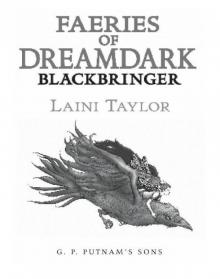 Blackbringer
Blackbringer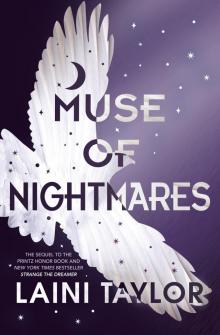 Muse of Nightmares
Muse of Nightmares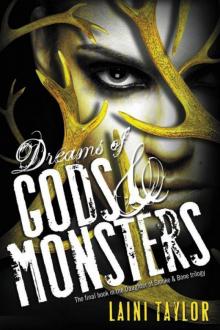 Dreams of Gods & Monsters
Dreams of Gods & Monsters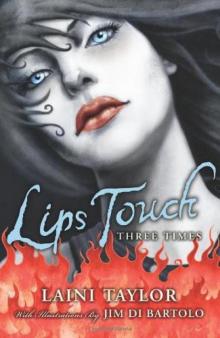 Lips Touch: Three Times
Lips Touch: Three Times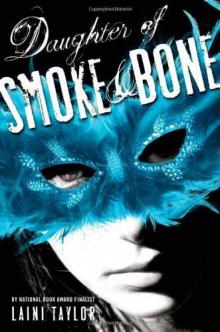 Daughter of Smoke & Bone
Daughter of Smoke & Bone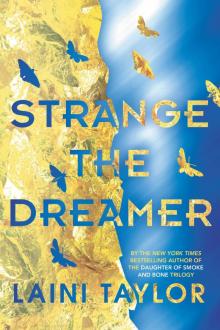 Strange the Dreamer
Strange the Dreamer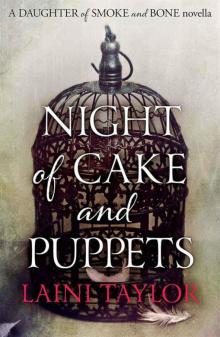 Night of Cake & Puppets
Night of Cake & Puppets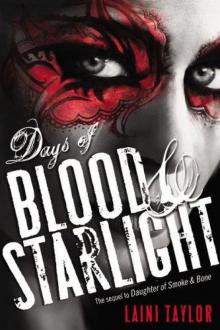 Days of Blood & Starlight
Days of Blood & Starlight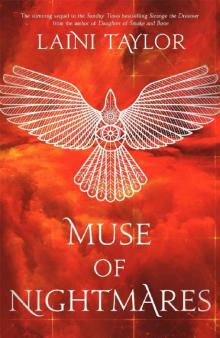 Muse of Nightmares (Strange the Dreamer #2_UK)
Muse of Nightmares (Strange the Dreamer #2_UK)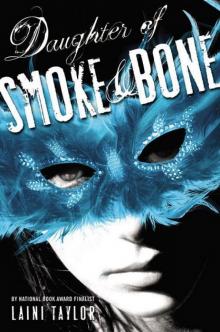 Daughter of Smoke and Bone dosab-1
Daughter of Smoke and Bone dosab-1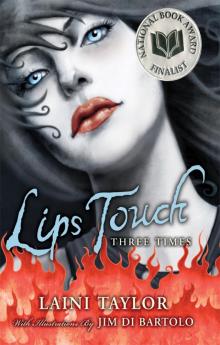 Three Times
Three Times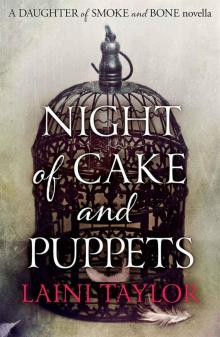 Night of Cake and Puppets (a Daughter of Smoke and Bone novella)
Night of Cake and Puppets (a Daughter of Smoke and Bone novella)